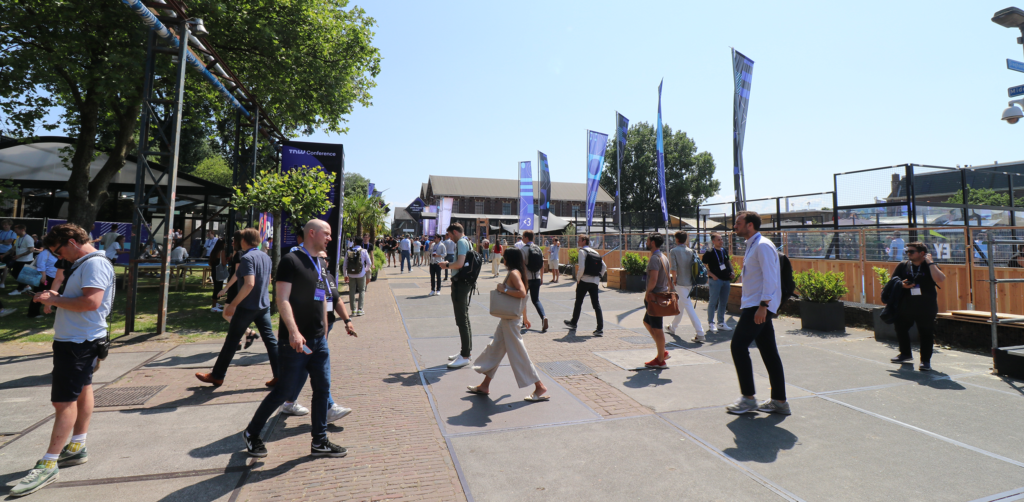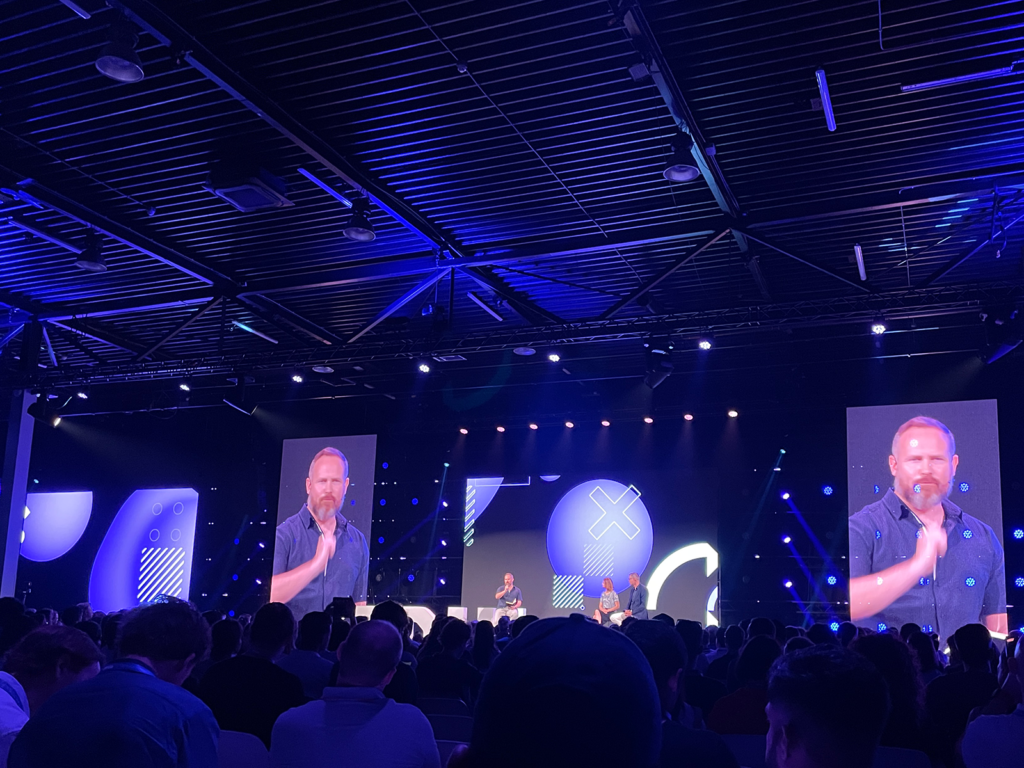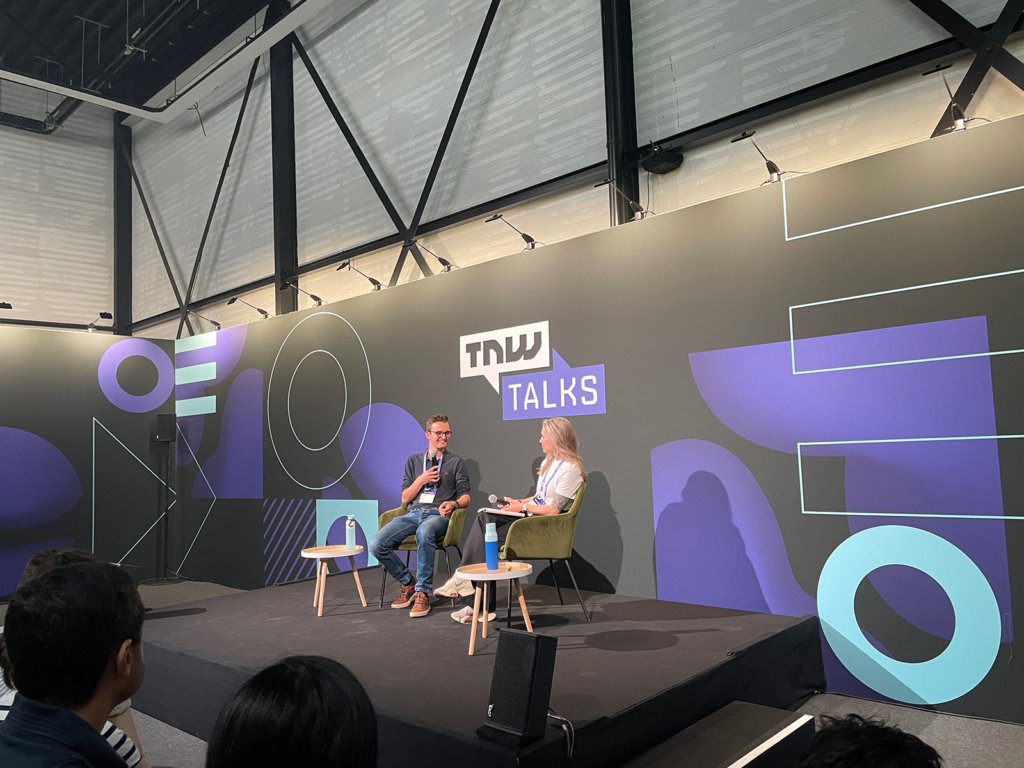
Human understanding in AI solutions
Highlights of TNW conference
From using the right data to the prompts given and understanding the presented outcome: all are important parts of the AI we use. The speakers at The Next Web (TNW) Conference of 2023 were trying to debunk the mysteries that are involved around AI. And Women in AI was invited.
Author: Ingrid van Heuven van Staereling.
AI is buzzing around the world. New technologies, developments and innovations in the AI field are taking over the world. So talking about it at the TNW Conference was inevitable. Women in AI was invited to attend the conference and share the insights within our community.

The right AI data
Using data for spamming reasons is not cool. Darian Shirazi, General Partner at Gradient Ventures, is convinced that data is so much more than what is applied in marketing nowadays. “I see AI as a great accelerator for humankind.” Making good use of the right data takes time. And it takes time for AI models to become good enough to do something smart. That is why Darian thinks it is so hard to catch up to companies like Google. They have many years of experience in working with and the training of these models.
“We need to start understanding the data we have.” Rob Elsinga, CTO at Microsoft NL, believes in the responsibilities companies have to create (and use) better input. “You can create a powerful model, but it still needs to be connected with the right data.” But even if you have data available, it might be a risk to use them. Shaun McGirr, EMEA Field Chief Data Officer at Dataiku, warns about the way AI can destroy data value chains. Most companies nowadays are trying to find ways to do something with their data. To automate administrative tasks or predict their clients behavior. But he points out that in older companies the data value chain is less organized. “Solving this by whacking AI technology on it is a big risk.” He claims. That is why he believes there are always three steps you need to take: “Get the data right, change the data and then you can make it happen.”

Using the right prompts
Prompt engineering was a big part of the discussion at TNW Conference. It gained significant attention due to its impact on AI systems and their outputs. By crafting well-designed prompts, you can guide the AI model’s responses towards a desired outcome. A good prompt helps to ensure relevance, accuracy and coherence in the generated content. More importantly, prompt engineering plays a crucial role in addressing biases and ethical concerns within AI systems. By carefully constructing prompts, you reduce the risk of biased or inappropriate outputs from AI models.
Mona de Boer, Partner data & Technology at PwC, speaks about the development of AI systems. “It is all about timing. In the short term it is all about optimizing the systems.” She sees possibilities in rescaling and upscaling this technology. Understanding how AI works and how we can work with AI gives us the opportunity to create a better future. All speakers agreed that they feel AI systems are rapidly evolving and we are still in the experimental phase. We need people to be able to effectively work with the systems. “Prompt engineer is a new skill we will all need.” Rob Elsinga mentioned during his session. It is key in facilitating effective collaboration between humans and AI systems.
“Don’t worry about robots taking over. Focus on what makes you human.”
The age old discussion: are robots taking over?
At TNW Talks Reinier Joosse, AI Community Lead at Aigency, gives more information about the importance of knowing how your AI came to its conclusion. “With black box AI you don’t know if it has been done based on the right reasons.” Even though black box AI can be faster and more accurate, glass or white box AI might be the better option to use. Why is it so important to know the reasoning behind AI’s outcomes? He shares an example of AI learning to recognise dog breeds. It had learned to connect snow to the Husky breed. Knowing which connections this AI made is crucial in understanding these conclusions weren’t very accurate yet.
It is obvious that AI is rapidly learning to get better. Danny Lange, SVP of AI at Unity Technologies, compares it to biological systems. “Biological networks are infrastructures of intelligence. Reinforcing these AI systems can also lead to intelligence.” You can do that by observing, take action on what you see and reward what has been good. “Sometimes the outcomes are useful, sometimes they are not.” Those developments take time.
If these AI systems are learning and getting better. Are they taking over our jobs? Many speakers are taking on this age old question about robots taking over. “Secretaries used to be scared robots would be taking over their jobs.” Shaun McGirr explains. “But it turned out laptops just made their work easier.” Shaun McGirr believes it’s the simple things AI can do to improve efficiency. “Don’t worry about robots taking over. Focus on what makes you human.” – he concludes in his presentation.
What about the creative industry? Chris Cunningham, Head of Influencer Marketing at ClickUp thinks these technologies won’t be taking our jobs, it just makes our jobs different. Lucas Bugter, Director of Operations at 433 agreed with that during their panel discussion: “Things are going faster, so we can simply create more things faster.” Zohar Dayan, SVP Product at Vimeo believes you should never use it, just for the sake of it. But he agrees it can help creatives give a starting point.

Taking responsibility
“We better think about how we use AI, since every company will eventually be using it.” Rob Elsinga explains how, at Microsoft NL, they have a number of principles they work with. “We are setting certain standards and we see it as a responsibility we have as a company.” He explains that their customer commitment is that they want to be completely transparent about sharing data.
At the same time we need to be real about the data there is when we go online. Or Lenchner, CEO at Bright Data: “Everytime you go to a website, public web data is there.” And there is a perfect opportunity to do good with it. “Acces to web data is so important.” He explains that when the Taliban took over in Afghanistan, the country was shut down. Fortunately, news platforms were able to access online data to investigate human rights. “When bad leaders want more power, they limit the access for people to public information. And it happens more often than you think.” He warns us.

Lessons learned
In conclusion: it is so important to make sure your AI model has access to the right data. Data can be key in making a difference. In the development of the technology, but also in society. It is also important to use the right prompts and be able to analyze what the AI model did to come to its decision or outcome. This way we are able to let it evolve.
As you may notice above, there are many men quoted in this article. Of the 10 great (AI related) sessions we were able to attend at TNW Conference, only 2 women were involved. And one of them was part of a (male dominated) panel. At Women in AI we believe that when a diverse group of people work with AI, it can help to eliminate the potential biases and create an inclusive AI that benefits our society. Women in AI has an active network of women that are doing just that. We were honored to be able to attend the conference, but are more than aware that there is still work to be done.